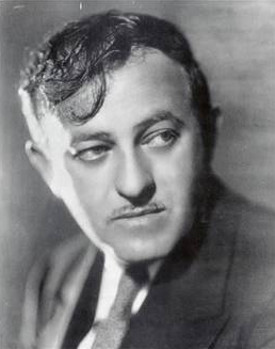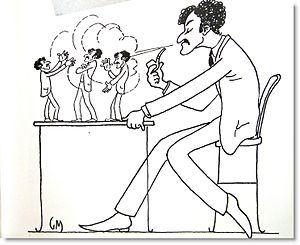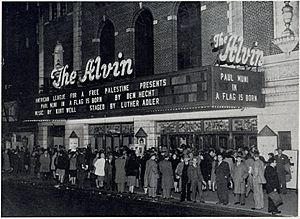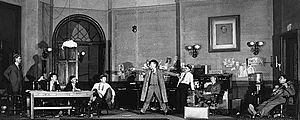Ben Hecht facts for kids
Quick facts for kids
Ben Hecht
|
|
|---|---|

Hecht in 1945
|
|
| Born | February 28, 1894 New York City, U.S.
|
| Died | April 18, 1964 (aged 70) New York City, U.S.
|
| Occupation |
|
| Style | Comedy, newspapers, gangster |
| Spouse(s) | Marie Armstrong (m. 1915; divorced) Rose Caylor
(m. 1926) |
| Children | 2 |
Ben Hecht (born February 28, 1894 – died April 18, 1964) was a very famous American writer. He was a screenwriter, director, producer, playwright, journalist, and novelist. He wrote 35 books and many popular screenplays and plays.
Hecht won the first ever Academy Award for Best Story for his movie Underworld (1927). Many of the films he worked on are now considered classics. A film historian named Richard Corliss called him "the Hollywood screenwriter." This means he was super important in Hollywood.
In 1940, he wrote, produced, and directed Angels Over Broadway. This movie was nominated for an Academy Award. In total, six of his movie screenplays were nominated for Academy Awards, and he won two of them!
In 1954, Hecht wrote his autobiography, A Child of the Century. An autobiography is a book about your own life. He was inducted into the American Theater Hall of Fame in 1983. This was 19 years after he passed away.
Contents
Early Life and Career
Ben Hecht was born in New York City. His parents were Jewish immigrants from Belarus. His father, Joseph Hecht, worked in the clothing business. His parents moved to New York from Minsk, which was in the Russian Empire.
The family later moved to Racine, Wisconsin. Ben went to high school there. For his bar mitzvah, his parents gave him many books. These included works by famous writers like Shakespeare and Mark Twain. When he was a teenager, he spent summers with his uncle in Chicago.
Ben was thought to be a child genius at age ten. He was learning to play the violin. But two years later, he was performing as a circus acrobat!
After high school in 1910, Hecht went to the University of Wisconsin–Madison for only three days. Then, at age 16 or 17, he moved to Chicago. He started working as a journalist. By age seventeen, he was a full-time reporter. He worked for the Daily Journal and later the Chicago Daily News.
After World War I, the Daily News sent Hecht to cover events in Berlin. While there, he wrote his first and most successful novel, Erik Dorn (1921). This book made him famous as a serious writer.
A 1969 movie called Gaily, Gaily was based on Ben Hecht's early life. It showed his time as a reporter in Chicago. The movie was nominated for three Oscars.
Becoming a Famous Writer
In 1921, Ben Hecht started a column for the Daily News. It was called One Thousand and One Afternoons in Chicago. This column was very popular and important. After that, Hecht wrote many novels, plays, screenplays, and memoirs.
After leaving the News in 1923, he started his own newspaper. It was called The Chicago Literary Times.
His autobiography, A Child of the Century, was published in 1954. Critics really liked it. This book made his writing reputation even better.
His first full play was The Egotist, produced in New York in 1922. While living in Chicago, he met another reporter, Charles MacArthur. They moved to New York together. They wrote a play about Chicago crime reporters called The Front Page. It was a huge success on Broadway. In 1931, it was made into a successful film. That movie was nominated for three Oscars.
Working in Hollywood
Ben Hecht came to Los Angeles when movies were just starting to have sound. He wrote the story for the gangster movie Underworld in 1927. For this first movie story, he won an Academy Award for Best Original Screenplay. This was at Hollywood's first Academy Award ceremony! Soon after, he became the "most prolific and highest paid screenwriter in Hollywood." This means he wrote the most movies and earned the most money.
Hecht would spend only two to twelve weeks in Hollywood each year. During this time, he earned enough money to live on for the rest of the year. He would then go back to New York. There, he worked on what he considered his "serious writing." Even so, he was a writer who felt Hollywood held back his true genius. But he also liked that Hollywood paid him so much!
Hecht became one of Hollywood's busiest screenwriters. He could write a full movie script in just two to eight weeks. With his writing partner, Charles MacArthur, he once wrote a movie called The Unholy Garden in only twelve hours!
Writing Styles
Ben Hecht was famous for two main types of movies. He wrote exciting crime thrillers and funny screwball comedies.
Some of his famous crime thrillers include Scarface (1932) and Notorious. For comedies, he wrote The Front Page, Twentieth Century, and Monkey Business (1952).
Hecht's movies were known for their lively humor. They also had very fast-paced stories.
Personal Life
Ben Hecht married Marie Armstrong in 1915 when he was 21. They had a daughter named Edwina. She later became an actress. Hecht then met Rose Caylor, who was also a writer. They left Chicago in 1924 and moved to New York.
Hecht divorced Marie in 1925. He married Rose Caylor that same year. They stayed married until Ben Hecht's death in 1964.
Ben and Rose had a daughter named Jenny Hecht. She was born in 1943 and became an actress at age 8. Jenny passed away in 1971 at the age of 27. A play about Jenny's life was performed in London in 2015.
Civil Rights Work
Ben Hecht cared about civil rights from early in his career. He wrote many stories about how Black and white people interacted. He even published a regular column called "Black-belt Shadows." This column was about Chicago and Black culture in America. He worked with a young Black student on his first play.
Hecht also wrote movie stories with Black characters. One example is Hallelujah, I'm a Bum. His most important movie about race was The Negro Soldier. This film honored Black soldiers. It was shown to soldiers and civilians during World War II.
Interesting Facts About Ben Hecht
- He is said to have secretly written books for other people. One was Marilyn Monroe's autobiography, My Story. But Hecht always said he didn't write it.
- He helped write many famous movies without getting credit. These include Gone with the Wind, The Shop Around the Corner, and Casino Royale (1967).
- In 1941, Hecht signed a statement asking the U.S. government to help England, the Soviet Union, and China in World War II.
- After the war, Hecht openly supported Jewish people in Palestine.
Academy Award Nominations
| Year | Category | Work | Result |
|---|---|---|---|
| 1927/28 | Best Writing (Original Story) | Underworld | Won |
| 1934 | Best Adaptation | Viva Villa! | Nominated |
| 1935 | Best Original Story | The Scoundrel | Won |
| 1939 | Best Screenplay | Wuthering Heights | Nominated |
| 1940 | Best Original Screenplay | Angels Over Broadway | Nominated |
| 1946 | Best Original Screenplay | Notorious | Nominated |
Screenplays
- Kiss of Death (1995)
- Casino Royale (1967) (uncredited)
- Circus World
- 7 Faces of Dr. Lao (uncredited)
- Cleopatra (1962) (uncredited)
- Billy Rose's Jumbo
- Mutiny on the Bounty (1962) (uncredited)
- Walk on the Wild Side (uncredited)
- North to Alaska (uncredited)
- John Paul Jones (uncredited)
- The Gun Runners (uncredited)
- Queen of Outer Space
- Legend of the Lost
- The Sun Also Rises (1957)
- A Farewell to Arms (1957)
- Miracle in the Rain
- The Iron Petticoat
- The Hunchback of Notre Dame (1956) (uncredited)
- Trapeze (1956) (uncredited)
- The Court-Martial of Billy Mitchell (uncredited)
- The Indian Fighter
- The Man with the Golden Arm (1955) (uncredited)
- Guys and Dolls (uncredited)
- Living It Up (based on his play Hazel Flagg)
- Ulysses (1955)
- Light's Diamond Jubilee (television)
- Terminal Station (1953) (uncredited)
- Angel Face (1952) (uncredited)
- Hans Christian Andersen (uncredited)
- Monkey Business (1952)
- Actors and Sin (1952) (also directed and produced)
- The Wild Heart (1952) (uncredited)
- The Thing from Another World (uncredited)
- The Secret of Convict Lake (uncredited)
- Strangers on a Train (1951) (uncredited)
- September Affair (uncredited)
- Where the Sidewalk Ends (1950)
- Edge of Doom (uncredited)
- Perfect Strangers (1950)
- Love Happy (uncredited)
- The Inspector General (uncredited)
- Whirlpool (1950)
- Roseanna McCoy (uncredited)
- Big Jack (uncredited)
- Portrait of Jennie (uncredited)
- Cry of the City (uncredited)
- Rope (1948) (uncredited)
- The Miracle of the Bells
- Dishonored Lady (uncredited)
- Her Husband's Affairs
- The Paradine Case (1947) (uncredited)
- Ride the Pink Horse (1947)
- Kiss of Death (1947)
- Duel in the Sun (1946) (uncredited)
- Notorious (1946)
- A Flag is Born
- Specter of the Rose (1946) (also directed and produced)
- Gilda (uncredited) (1946)
- Cornered (1945) (uncredited)
- Spellbound (1945)
- Watchtower Over Tomorrow (1945 OWI film)
- Lifeboat (1944) (uncredited)
- The Outlaw (1943) (uncredited)
- China Girl (1942)
- Journey into Fear (1943) (uncredited)
- The Black Swan (1942)
- Ten Gentlemen from West Point (uncredited)
- Roxie Hart (uncredited)
- Lydia
- The Mad Doctor (1941) (uncredited)
- Comrade X
- Second Chorus (uncredited)
- Angels Over Broadway (1940) (also directed and produced)
- Foreign Correspondent (1940) (final scene-uncredited)
- The Shop Around the Corner (1940) (uncredited)
- His Girl Friday (1940)
- I Take This Woman (1940) (uncredited)
- Gone with the Wind (1939) (uncredited)
- At the Circus (uncredited)
- Lady of the Tropics
- It's a Wonderful World (1939)
- Wuthering Heights (1939)
- Let Freedom Ring
- Stagecoach (1939) (uncredited)
- Gunga Din (1939)
- Angels with Dirty Faces (1938) (uncredited)
- The Goldwyn Follies
- Nothing Sacred (1937)
- The Hurricane (1937) (uncredited)
- The Prisoner of Zenda (1937) (uncredited)
- Woman Chases Man (uncredited)
- King of Gamblers (uncredited)
- A Star Is Born (1937) (uncredited)
- Soak the Rich (also directed)
- The Scoundrel (1935) (also directed)
- Spring Tonic
- Barbary Coast
- Once in a Blue Moon (1935) (also directed)
- The Florentine Dagger
- The President Vanishes (uncredited)
- Crime Without Passion (1934) (also directed)
- Shoot the Works
- Twentieth Century (1934) (uncredited)
- Upperworld
- Viva Villa! (1934)
- Riptide (1934) (uncredited)
- Queen Christina (1933) (uncredited)
- Design for Living (1933)
- Turn Back the Clock
- Topaze (1933)
- Hallelujah, I'm a Bum (1933)
- Back Street (1932) (uncredited)
- Rasputin and the Empress (1932) (uncredited)
- Million Dollar Legs (1932) (uncredited)
- Scarface (1932)
- The Beast of the City (1932) (uncredited)
- The Unholy Garden (1931)
- The Sin of Madelon Claudet (1931) (uncredited)
- Monkey Business (1931) (uncredited)
- Homicide Squad (1931) (uncredited)
- Quick Millions (1931) (uncredited)
- Le Spectre vert
- Roadhouse Nights (1930)
- Street of Chance (1930)(uncredited)
- The Unholy Night (1929)
- The Great Gabbo (1929)
- The Big Noise (1928)
- The American Beauty (1916) (uncredited)
- Underworld (1927)
- The New Klondike (1926) (uncredited)
Books by Ben Hecht
- Erik Dorn (1921)
- Gargoyles (1922)
- Kingdom of Evil (1924)
- Humpty Dumpty (1924)
- Broken Necks (1926)
- Count Bruga (1926)
- A Jew in Love (1931)
- The Champion from Far Away (1931)
- Actor's Blood (1936)
- The Book of Miracles (1939)
- 1001 Afternoons in New York (1941)
- Miracle in the Rain (1943)
- A Guide for the Bedevilled (1944)
- I Hate Actors! (1944)
- The Collected Stories of Ben Hecht (1945)
- The Cat That Jumped Out of the Story (1947)
- Cutie - A Warm Mamma (1952) (co-authored)
- A Child of the Century (1954)
- Charlie: The Improbable Life and Times of Charles MacArthur (1957)
- The Sensualists (1959)
- A Treasury of Ben Hecht: Collected Stories and Other Writings (1959)
- Perfidy (1962)
- Gaily, Gaily (1963)
- Concerning a Woman of Sin (1964)
- Letters from Bohemia (1964)
Plays by Ben Hecht
- The Hero of Santa Maria (1916)
- The Egotist (1922)
- The Stork (1925)
- The Front Page (1928)
- The Great Magoo (1932)
- Twentieth Century (1932)
- Jumbo (1935)
- To Quito and Back (1937)
- Ladies and Gentlemen (1939)
- Lily of the Valley (1942)
- Seven Lively Arts (1944)
- Swan Song (1946)
- A Flag Is Born (1946)
- Winkelberg (1958)
See also
 In Spanish: Ben Hecht para niños
In Spanish: Ben Hecht para niños
 | James Van Der Zee |
 | Alma Thomas |
 | Ellis Wilson |
 | Margaret Taylor-Burroughs |




